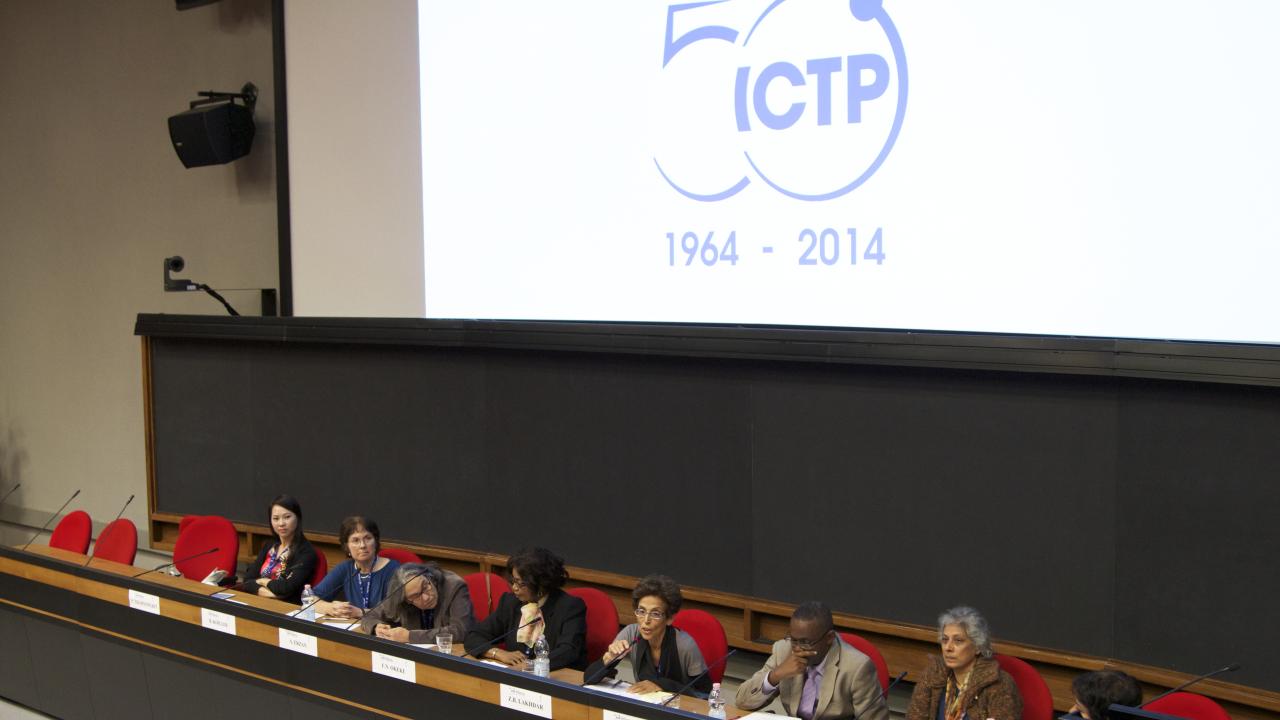
Why are there still fewer women than men in science? In a world where just 30% of the world's researchers are women, the reasons are many, ranging from the challenge of balancing family life and career to lack of child care support and role models. These issues and others provoked intense and at times personal discussions during ICTP's double panel session on women in science, held on day 2 of its 50th anniversary celebrations.
In its new strategic plan for 2015 to 2019, ICTP has committed to increase the number of women at ICTP in all roles. The anniversary sessions provided an important first step in developing a blueprint for reaching the Centre's gender goals. The panelists, comprising eminent and predominantly female scientists, shared their experiences and their suggestions for future improvements.
The first panel, enthusiastically chaired by particle physicist Rohini Godbole, provided a variety of perspectives of scientists from Italy, Argentina, Brazil, the United Kingdom, and the United States who presented institutional barriers in education, culture, and attitudes and suggested ways they might be fixed.
Luciano Maiani, former Director General of CERN, related how he had tried to start a kindergarten at CERN and been denied by the unions. Chiara Nappi, an Italian physicist who teaches at Princeton, spoke about educational structural differences between the US and Italy that in her experience led to bottlenecks preventing American women from entering physics, while Marianna Weissman, a physicist from Argentina and the first winner of the UNESCO L'Oreal Prize in her country said that women must be willing to step into the limelight and serve as role models. "It is important that your voice be heard," agreed physicist Shirley Malcom of the American Association for the Advancement of Science.
While some of the speakers expressed optimism about the opportunities for women in science in upcoming years, others stressed the work yet to be done. "We still have a long way to go," said Ingrid Daubechies, the current (and first female) president of the International Mathematical Union. Marcia Barbosa, from the Universidade Federal do Rio Grande do Sul, urged the attendees to serve as mentors to young women in their fields, and Martin Rees of the University of Cambridge suggested a role for ICTP to play: "It's rather embarrassing that of the 40 winners of the Dirac Prize, there's only been one woman."
The second panel, moderated by professor of theoretical sciences Shobhana Narasimhan, addressed the challenges facing women scientists in the developing world. In her opening remarks, Narasimhan suggested that in many cases, it is easier for women to be scientists in developing countries. Marianna Weissmann had already raised that idea in the first panel when she noted her shock that some universities in the United States were still single-sex institutions. Belita Koiller of the Brazilian Physical Society later added that there weren't any special challenges to being a physicist in her country just because she was a woman. Rather, it was the lack of infrastructure that was a burden.
Ayse Erzan, a panelist from Turkey, a country with many female physicists, credited the role of the government in creating an academic environment with many professorships that were open for women. "In the sciences, academia was a tabula rasa, a chance for women to assert themselves and make a career. There were no corridors of bearded male busts to intimidate women." Panelists from other countries, such as TWAS Executive Director Romain Murenzi, who hails from Rwanda, said the gender gap has closed, while Sujatha Ramdorai, who completed her PhD in her home nation of India, urged her country's leaders "to go beyond tokenism" and improve the support structure for women.
Yet other women recounted how they were helping to change the norms in their countries. Francisca Nneka Okeke of the University of Nigeria was the first female head of the physics department there, and said she had to fight against cultural attitudes that science is a competitive, rough, and masculine pursuit. "I had to be firm," she said. But once the department saw the difference between men and women leaders, she won the next election for the position in a landslide. "We have to stand firm and face these challenges," Okeke said. "A woman can sit here and do a better job."
2013 ICTP Prize winner Patchanita Thamyongkit said that cultural attitudes about women and the young were also changing in her country, Thailand. During her undergraduate years, there were very few female professors but "now, the opportunity is not bad in terms of gender," Thamyongkit said. But cultural traditions remain strong, and administrators continue to be overwhelmingly male. She said she was grateful to receive the ICTP Prize because "it speaks for me - she can do it!" She concluded the panel by urging the older generation of physicists in the audience to give young women opportunities. "If you just make it available, women will step out and do it."
Godbole and Narasimhan announced plans to compile the suggestions from the panels and present them as a strategic plan to ICTP Director Fernando Quevedo on Friday.













